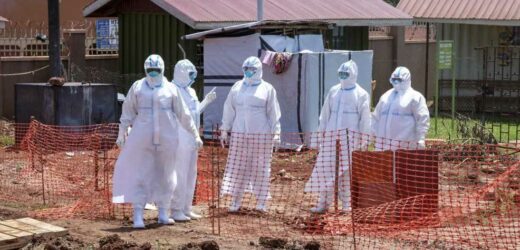DOCTORS in the UK have been told to be on high alert after an Ebola outbreak in Uganda killed 10 people.
Health officials say the risk to the public in the UK is very low and there are currently no cases of the disease confirmed in the UK.
Uganda has been hit by the Sudan strain of the deadly virus, for which there is currently no proven vaccine.
There have been 43 confirmed cases in the country, with four health workers among the 10 people confirmed to have died.
The UK Health Security Agency (UKHSA) says it’s currently monitoring the outbreak of the disease.
A public health alert has been issued urging healthcare professionals to look out for symptoms in patients who have recently returned from affected areas
READ MORE ON EBOLA
New fears as man dies of Ebola weeks after six deaths from ‘strange illness’
Two people die after testing positive for Ebola-like Marburg virus in Ghana
It also reminds them of the established procedures for infection control and testing.
Dr Meera Chand, UKHSA Director of Clinical and Emerging Infection, said: “UKHSA constantly monitors emerging infection threats in collaboration with partners across the world.
"We are aware of an outbreak of Ebola cases in Uganda and are monitoring the situation closely. The risk to the public in the UK is very low.”
Uganda has had multiple Ebola outbreaks, including one in 2000 that killed more than 200 people.
The current Ebola outbreak in central Uganda has a 69 per cent case fatality rate.
Ugandan scientists and their partners abroad are looking to deploy one of two possible vaccines against the Sudan strain, the World Health Organisation has said.
Most read in News
Moment 3 ‘have-a-go heroes’ knifed ‘trying to stop phone thieves’ in City
'Youngest ever' ASBO boy, now 18, stabbed 27 times after bid to be drug boss
Moment tiny coffins carry away 24 kids killed by ex-cop in Thailand
Teen, 18, fighting for life after being stabbed repeatedly outside station
But the UN body said there are currently 100 doses of available.
Meanwhile, the US government has said it will be screening all travellers from Uganda for Ebola.
What are the symptoms of Ebola?
The virus has an incubation period of two to 21 days, meaning symptoms can take up to three weeks to appear from the time of infection.
Early symptoms of Ebola include:
- fever
- headache
- muscle pain
- sore throat
- weakness
They are similar to those of other diseases, making diagnosis tricky in some cases.
Later, as the disease progresses, it can cause:
- diarrhoea
- vomiting
- rash
- impaired kidney and liver function
- stomach pain
- internal and external bleeding
The Ebola virus disease – previously called Ebola haemorrhagic fever – is a viral infection that occurs in humans and primates.
It causes an acute, serious illness which is often fatal when left untreated.
The virus begins with symptoms including fever, intense fatigue, muscle pain and a sore throat, before progressing to vomiting and diarrhoea as well as internal and external bleeding.
The virus is part of the Filoviridae family, which also includes the Marburg virus.
It was first detected in regions close to the River Ebola, which gave the disease its name.
How is Ebola treated?
There is currently no licensed treatment or vaccine available in theUK.
Currently, the only vaccines available are for the Zaire strain of the virus and have been used to control outbreaks in Guinea and in the Democratic Republic of the Congo.
People who have the infection are treated in isolation in intensive care.
Read More on The Sun
I ‘un-school’ my kids while living in a van – people judge but they’re wrong
Drivers warned parking their car overnight could lead to hefty fines
Ebola is very contagious and spreads through contact with the blood, body fluids or organs of a person or animal with the infection.
The disease cannot be caught through routine social contact such as shaking hands with people who do not have symptoms.
Source: Read Full Article











